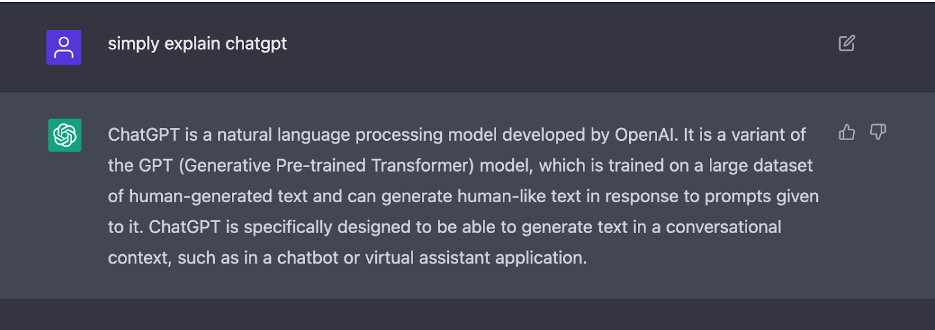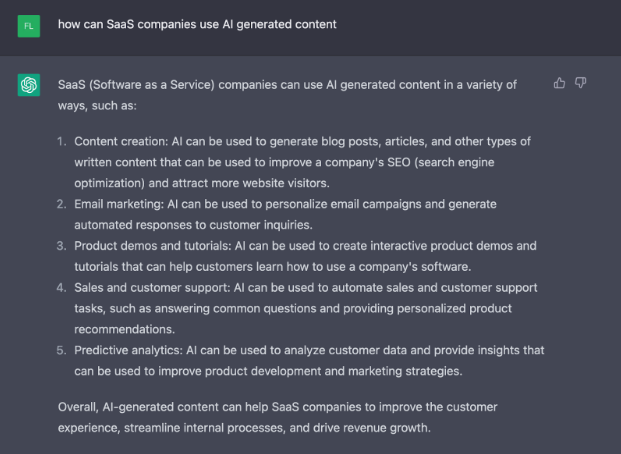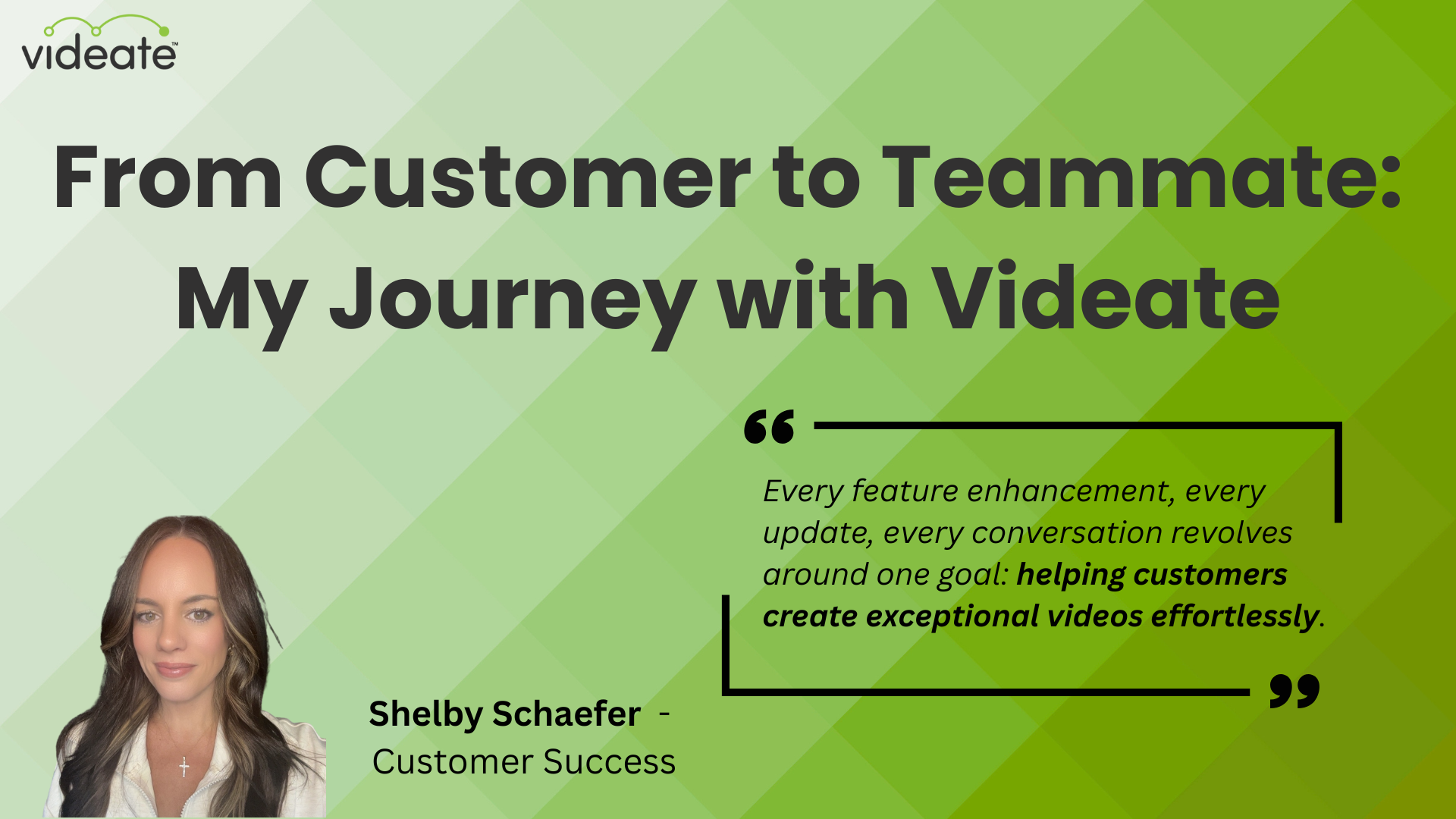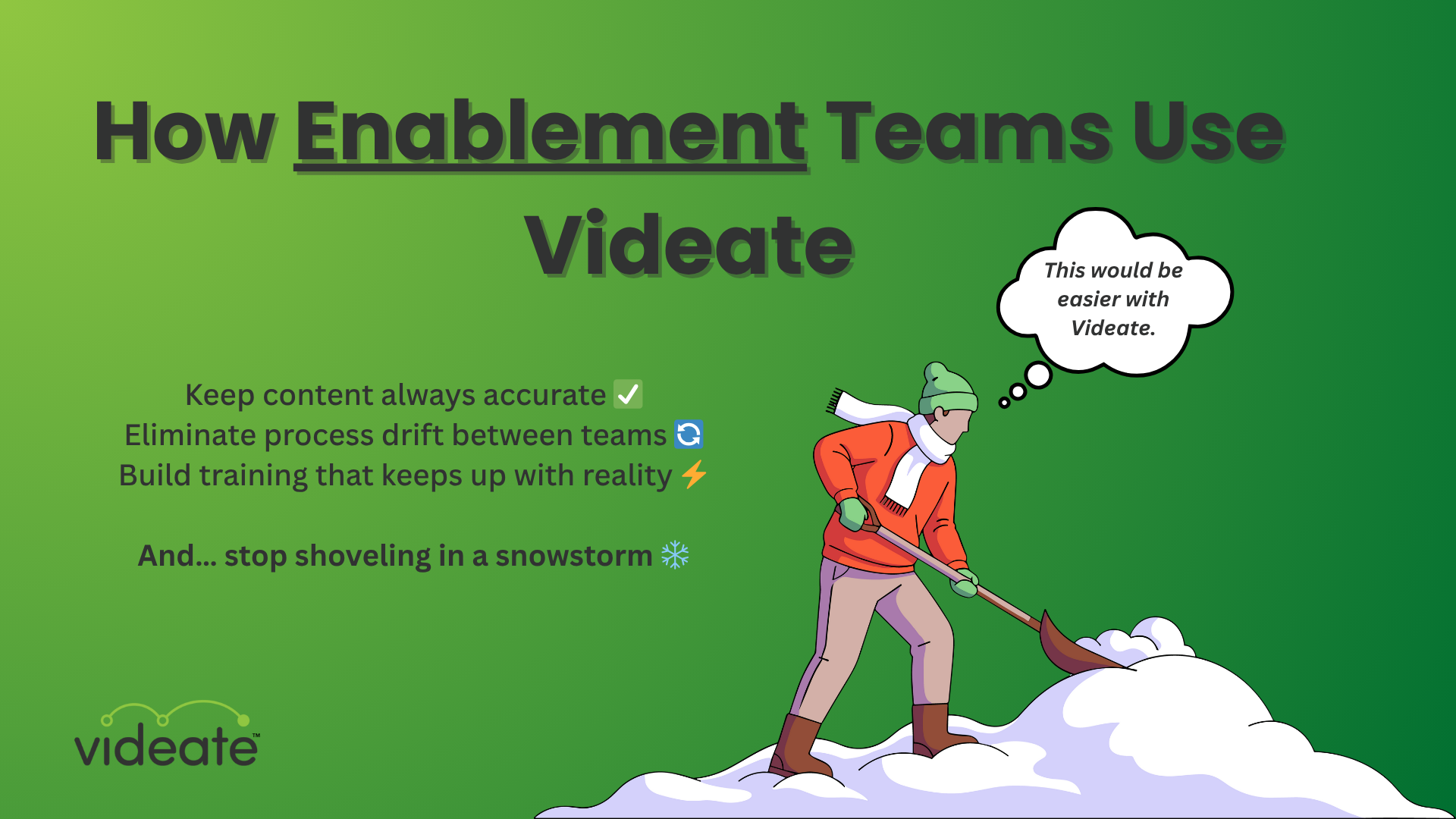
AI generated content – it’s currently the biggest, buzziest subject in the worlds of business, technology, and art. It’s controversial, but it’s also the future.
As Wayne Boulais, Co-Founder & Managing Director Tensility Venture Partners, states, “This is the dawn of a new era. This is going to move incredibly fast and it’s going to move in many, many different places.”
If you’re not exploring how AI generated content can impact your SaaS business, you’re not paying attention. Boulais adds,
“What it does, better than most humans, because it’s trained on language models, it actually does the structure of how you would deliver the piece in a linguistically correct and well understood way. Ask it to do a blog post, on any topic, and it will do it.”
(uh-oh…)
How does AI generated content work?
What is AI generated content? Let’s get the information from the source: ChatGPT, an AI generated chatbot from OpenAI.
I asked ChatGPT to simply explain what it does, and seconds later, it wrote this:
ChatGPT is a natural language processing model developed by OpenAI. It is a variant of the GPT (Generative Pre-trained Transformer) model, which is trained on a large dataset of human-generated text and can generate human-like text in response to prompts given to it. ChatGPT is specifically designed to be able to generate text in a conversational context, such as in a chatbot or virtual assistant application.

Next, I asked ChatGPT what AI Generated content can do for SaaS companies, and a few seconds later, the answer appeared:
SaaS (Software as a Service) companies can use AI generated content in a variety of ways, such as:
1. Content creation: AI can be used to generate blog posts, articles, and other types of written content that can be used to improve a company's SEO (search engine optimization) and attract more website visitors.
2. Email marketing: AI can be used to personalize email campaigns and generate automated responses to customer inquiries.
3. Product demos and tutorials: AI can be used to create interactive product demos and tutorials that can help customers learn how to use a company's software.
4. Sales and customer support: AI can be used to automate sales and customer support tasks, such as answering common questions and providing personalized product recommendations.
5. Predictive analytics: AI can be used to analyze customer data and provide insights that can be used to improve product development and marketing strategies.
Overall, AI-generated content can help SaaS companies to improve the customer experiences, streamline internal processes, and drive revenue growth.

Impressive. Really impressive. Also, a little scary. Because we are looking at the future.
The AI Content Generator Controversy
As with any industry-shaking technology, there are many controversies surrounding it. From how some AI services get their data, to privacy concerns, to the possibly sketchy (or dangerous) ways AI can be utilized (such as deepfakes in politics), there are almost too many controversies to keep track of.
In terms of SaaS applications, there are three major controversies to keep top of mind:
1) Lack of sources
AI generated content is built on a tremendous (and constantly growing) pool of information. When content gets generated, however, there are no sources for the information. So, essentially, there's no way to automatically fact-check the output.
Again, Wayne Boulais explains:
“You can’t search for explainability for why it came up with its answers. There’s no way to do it right now, given it’s a deep learning model. That’s inherent in every deep learning model. The explainability doesn’t exist. You can’t fact check.”
2) Bias in what is generated
AI algorithms can perpetuate and even augment existing biases in the data they are trained on. This can lead to AI-generated content that is discriminatory or reinforces stereotypes. From an ethical, legal and marketing standpoint, this can be very troubling.
As Boulais explains:
“It’s a statistical model, so it’s always going to go towards the most likely outcome given the information it was fed. Well, there’s bias in the information that was fed, because there’s bias in the information that was written. And it’s inherent in everything that we do. There’s always bias.”
3) Job displacement
As with any technological innovation, people wonder if their jobs are going to be rendered redundant. And, especially in the creative fields, this is a legitimate question to ask.
If high-quality content is automated in seconds by AI...
Then what do human content generators do?
So, does AI generated content mean my job is at risk?
The short answer is – maybe. Certainly, it will change how content creators approach their job. Boulais explains:
“Just like every new technology, there’s going to be new job categories that are created, and there will be some job categories that are diminished or obsoleted. So, there’s a fair amount of dislocation. Like most technologies, I don’t think we’re going to have less humans, I think we’ll just have humans doing different things."
He remains confident that there is a place for people in an AI generated content world, and it has to do with addressing the other controversies that AI generated content leaves itself exposed to.
“There’s always going to be a human in the loop in the near future, because it’s still not good enough, and nobody’s going to trust it, because you can’t fact check it… You need to have individual domain experience to know whether what it generated is correct or not.”

Essentially, content creators need to think of themselves as having gotten a promotion. They are managers now.
The AI does the heavy lifting – as any content creator knows, the hardest part is looking at a blank piece of paper (or screen).
This powerful tool can give you direction, structure and details before you even get started.
AI generated content is the first draft, and as the manager of this content, it is your job to edit it, fact check it, and build off it to your exact specifications and needs to make the final product. There will always be a place for subject matter experts, customer education professionals, programmers, marketers, and creative minds.
Employees must be open to this new tool and find their value in using it. There is simply no other choice, because the technology is here to stay.
Can an AI video generator solve my video problems today?
AI generated content platforms like ChatGPT are great tools for building scripts, images, and physical assets for video production. In the near future, AI can data mine product documentation and create excellent scripts in mere seconds.
This catapults companies forward along the Software Video Maturity Model, making it that much closer to an optimized production of videos with continuous delivery of customer assets. As Boulais said, “(Using this for) script generation… it’s not a heavy lift. And I think most script writers will enjoy it. This is going to accentuate their value add.”
However, currently generative AI cannot create entire video productions. It cannot sync the script with the visuals and actions needed for technical and educational videos. Fortunately, Videate has this covered.
Videate is at the forefront of video automation and embraces the responsible use of AI generated content.
Stop trying to work harder and work smarter – get a demo today and see how just one person can generate an entire video library in less than a day!
.png)
How Customer Success & Education Teams Use Videate



